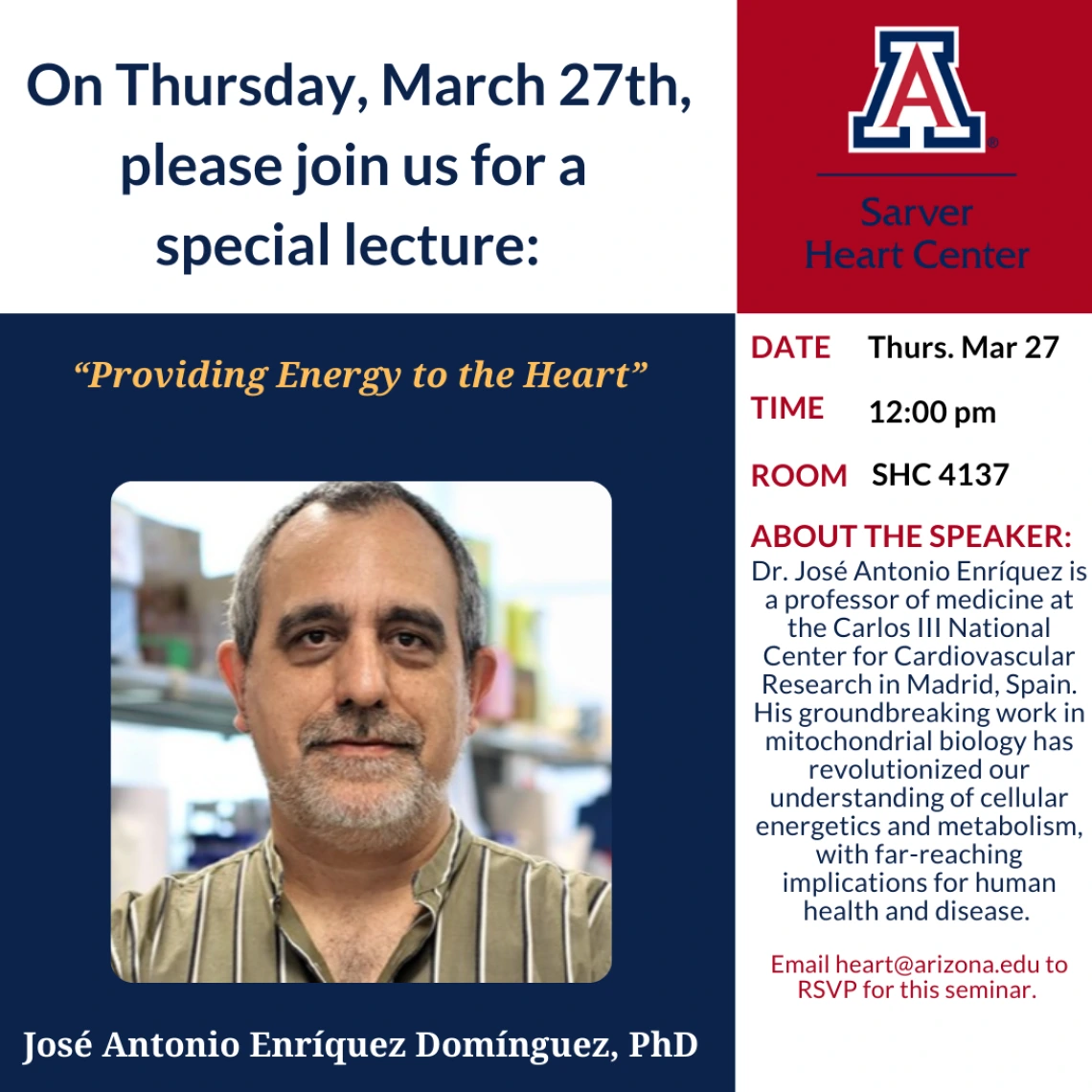University of Arizona Sarver Heart Center
Image

When
Noon – 1 p.m., March 27, 2025
On Thursday, March 27, we will be welcoming José Antonio Enríquez Domínguez, PhD, as a Sarver Heart Center Research Seminar lecturer.
Where
Sarver Heart Center, Room 4137
Host
Hesham Sadek, MD, PhD
Presenter
José Antonio Enríquez, PhD, graduated in Biochemistry and Molecular Biology from the Autonomous University of Madrid in 1986 and received his PhD from the University of Zaragoza (UniZar) in 1992. During his PhD he studied various aspects of mitochondrial DNA biogenesis (mtDNA). Between 1993 and 1997 he moved to the laboratory of Dr. Giuseppe Attardi at the California Institute of Technology where he investigated the pathogenic action of mutated mitochondrial tRNAs. His work during this period allowed him to to define the molecular mechanism causing the diseases due to these mutations and helped establish a general methodology for the study of mitochondrial tRNAs. This methodology has been applied by other groups in mitochondrial biogenesis studies, as well as in the analysis of diseases related to mtDNA. In 1997 José Antonio returned to UniZar stablishing his own research group, he obtained the position of associated professor in 1999 and become full professor in Biochemistry and Molecular and Cellular Biology in 2007. Between September 2007 and May 2008, he made a sabbatical stay at the MRC- Mitochondrial Biology Unit in Cambridge, England. He joined the Carlos III National Center for Cardiovascular Research as full professor in 2009. From September 2014 to August 2015, he carried out a second sabbatical stay at Boston University in the laboratory of Dr. Orian Shiriai.
Dr. Enríquez has generated 184 publications, obtaining more than 17,500 citations and with an H-index of 71 and has made outstanding contributions to the understanding of mitochondrial biogenesis and bioenergetics, its role in cell apoptosis, structure and regulation of the respiratory chain, the pathological consequences of the alteration of mitochondrial function and the relevance of the mtDNA population genetic variability in metabolism, longevity, and susceptibility to diseases. Enríquez was elected EMBO Member in 2021 and has been awarded the prizes XVI Premio de la FUNDACION FRANCISCO COBOS to the Scientific Career in 2022 and MARGARITA SALAS (Comunidad de Madrid) to the Scientific Career also in 2022.
Dr. Enríquez has generated 184 publications, obtaining more than 17,500 citations and with an H-index of 71 and has made outstanding contributions to the understanding of mitochondrial biogenesis and bioenergetics, its role in cell apoptosis, structure and regulation of the respiratory chain, the pathological consequences of the alteration of mitochondrial function and the relevance of the mtDNA population genetic variability in metabolism, longevity, and susceptibility to diseases. Enríquez was elected EMBO Member in 2021 and has been awarded the prizes XVI Premio de la FUNDACION FRANCISCO COBOS to the Scientific Career in 2022 and MARGARITA SALAS (Comunidad de Madrid) to the Scientific Career also in 2022.
Enríquez's groundbreaking work in mitochondrial biology has revolutionized our understanding of cellular energetics and metabolism, with far-reaching implications for human health and disease.

